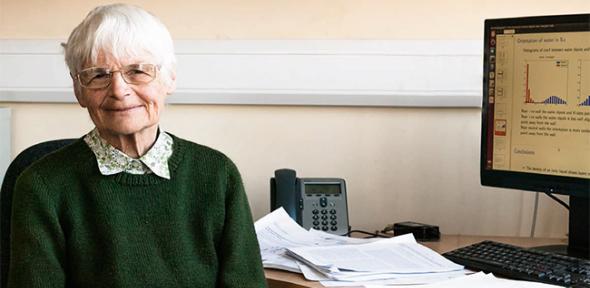
Ruth Lynden-Bell, Professor Emerita of Queen’s University Belfast, is an alumna of the department and a long-standing visiting professor. We asked Ruth how it felt to be a woman chemist in the 1950s and how motherhood impacted on her work.
We were not surprised to hear that when Ruth became a chemistry graduate student she was was probably the only one in the department. Ruth explains, "I stayed at Newnham College, where I’d been an undergraduate, so I had a lot of friends who where doing PhDs, although not in chemistry. For me the women’s college provided a very good support and was a very different environment from the department." After Ruth's first child was born she changed the direction of her career: "I started as an experimental spectroscopist in NMR. But in Sussex I did move to being entirely a theorist. The great advantage about being a theorist is that you can put it down at three o’clock or whenever you have to go home.
“I’m in the same year as Ian Fleming and Tony Kirby (fellow emeritus professors). I’m a Fellow of New Hall, now Murray Edwards. I think there were three women doing part 2, if I remember rightly. Then when I became a graduate student, I was probably the only one, I couldn’t swear to that. But I stayed at Newnham College where I’d been an undergraduate, so I had a lot of friends who where doing PhDs, although not in chemistry - in other science departments and the arts. For me the women’s college, and there were only women’s colleges then, provided a very good support and was a very different environment from the department. But it’s also true that if there’s only one of you, you don’t notice you’re different. It’s when you get more than one you start to notice!
“My research supervisor, Norman Sheppard, who died last year at the age of 93, was always very careful to make sure when we had visitors that it was clear that I was a graduate student, to make sure people realised. And the other thing is that being a member of a women’s college, the people who supervised us were all people who wanted to teach women and were quite prepared to treat us equally. It was only later, in the 70s, when there were a lot more women and there were mixed colleges that some women felt that they didn’t belong.
“I would say my generation never had any feeling that we didn’t belong. I think that was one of the strengths of the women’s colleges. We could see successful women academics. All the fellows were women and they were academics. It was important for me as a research student to have the network and the social life of the college, to meet other research students in college as well as here in the lab.”
How did motherhood affect your career?
“Well, what I did was to work part-time for a number of years.
It happened that when our first child was born we moved down to Sussex, and so I went to see the Sussex University chemistry professor and said I wanted half a lectureship! I mean if there’s only one of you, you can say these things. He shook his head and said they’d never done that before, and as the university was by then two years old, I thought that was a pretty poor argument but actually they did give me half a job. And so I was there for seven years and always had strong support from my colleagues. I also changed the direction of my career. I started as an experimental spectroscopist in NMR. There was always a theoretical side to what I was doing, but in Sussex I did move to being entirely a theorist. The great advantage about being a theorist is that you can put it down at three o’clock or whenever you have to go home, whereas if you’re doing experiments it’s much more difficult. It was a way of giving your family and your career a good shot, particularly, in those days when one felt slightly guilty about going out to work.
“Things have changed (e.g. maternity leave, nurseries) but employing help was relatively less expensive. It would be interesting to compare experiences with a postdoc, with children, working in the department today. But I would give two bits of advice to women starting out now:
(1) Don’t be afraid to ask for things such as part time work. Apart from the Belfast job, every job I got was by asking for it, and
(2) When opportunities arise take them, it’s worth trying. I never imagined going to Belfast.
Currently Ruth uses computer simulation to study the behaviour of liquids. Her main interest is ionic liquids (molten salts such as dimethyl imidazolium chloride) and solutions in them. She collaborates with spectroscopists in Texas and simulators in Spain. Ruth can be found in her office most days and has no plans to change that pattern.
Ruth’s life in chemistry features in the recently re-launched Royal Society book Parent Carer Scientist.
CV
1956 Came up to Newnham College to read Natural Sciences
1959 Part II Chemistry; became a Research Student in NMR
1961 Got married and went to Cal Tech for a year to work with Harden McConnell
1962 PhD in Chemistry, University of Cambridge
1962-65 Fellow and College Lecturer at New Hall (now Murray Edwards)
1965-72 Lecturer (half-time) in Chemistry at the University of Sussex
1972-95 Fellow and College Lecturer at New Hall and at St John's College from 1975
1995-2003 Professor in the School of Maths and Physics at Queen's University, Belfast
2003 Retired and returned to Cambridge

